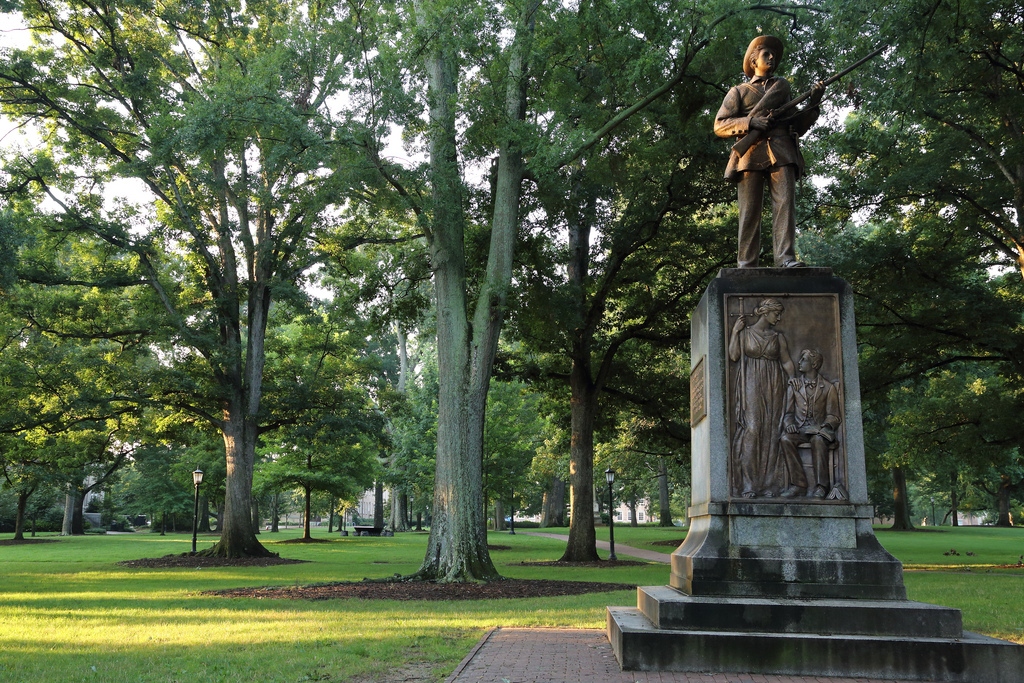A Full Bird Exclusive
September 10, 201809/10/2018 From the Right
Silent Sam and Kneeling Colin — What we're actually fighting about

Every week there is something to be outraged at, no matter what side of the aisle you sit on. The latest examples of course are Nike's Colin Kaepernick marketing campaign and the fate of the Silent Sam statue at UNC Chapel Hill. These two fights, and many other recent ones, come down to what respect, if any, should be given to certain cultural symbols. But why are they so important to us that we can't seem to stop posting on social media and attending protests over them?
If you ask a lot of Americans why they are mad at Nike and at the NFL, they might not have a clear answer ready. But on some reflection, they may say something like, "My family came over here from ____ with nothing but the clothes on their backs. My grandfather died in World War II for this country while my grandmother worked in the factories to get through the Great Depression. That flag and that anthem are what they fought for and what they helped build. For an American to disrespect it like that is like spitting on the graves of my family."
If you ask many African-Americans though why they stand by Colin Kaepernick and others as they kneel during the anthem, they may have a story that is also based in history, of both their family and the country. Maybe something like, "My ancestors were forced onto ships and across the ocean just to be treated like farm animals for generations. When we were finally freed, we were still treated like second-class citizens. This may have changed in a legal sense, but the legacy of it lives on in many ways. Also, this isn't history to many of us. People still living now were considered legally inferior and were denied access to schools and business opportunities and simple human dignity, and we sat at their feet as children listening to these stories. The way we are treated today by the police often makes it feel like not much has changed."
Can we really hope to argue until we "prove" one of these stories is right? They are both true and they both reflect real experiences of people who believed in something and sacrificed everything (to steal a phrase from a recent Nike campaign).
Retelling the American story
It's not uncommon for two groups of people living side-by-side to have conflicting stories of their cultural origins. They will both have their heroes and their legends and their sacred symbols. The problem is when these two groups identify themselves in opposition to one another.
The Israelis and Palestinians are an extreme example of that. The Israelis have a story based in real history that tells how they were chased simultaneously out of almost every region of the world. With nowhere else to turn, and notably with even America turning back ships of Jewish refugees, they resettled in their original homeland. The Palestinians, under the leadership of Grand Mufti Amin Al-Husseini, largely cooperated with the Nazis in trying to exterminate them, so they had to fight many of their new neighbors to survive.
The Palestinians obviously would argue they were colonized by groups of Jews who had lost all connection with the land by being absent for many centuries, and they had no right to return. The land was therefore stolen and a fight to expel them is justified. Let's hope our stories do not become as oppositional as this.
A story of slowly but surely expanding dignity
If we find a way to retell the story carefully so both sides of the debate feel like their history is being respected, it's possible to avoid this cycle of hysteria polluting our discourse. One way of doing this is seeing the principles, not the history, of the nation as the uniting factor. The principle that we are all created equal and are due equal dignity under the law is a good place to start. It was very successful as applied within the group who founded the nation, English upperclass Protestant men, but everyone else was left out. A bit later, other northwestern European Protestants, like Germans, Dutch, and Scandinavians, were invited into the club. Then women were given more rights. Then white Catholics and Jews were included. Then finally African-Americans were given legal rights equal to the rest of society. Naturally, attitudes didn't immediately follow law in this acceptance.
We could call this the story of "slowly but surely expanding dignity." I believe this is the shared story we need to focus on to avoid spiraling further apart. I've heard this balance struck in political speeches and articles, so I'm not claiming it as an original idea. It's one that makes room for both rivaling stories though.
More conservative types, like myself, can become more comfortable admitting the sins of history if we are granted the point that the founding principles were not at fault; they were just not fully applied to all people yet. We will not be in defensive mode trying to protect our sacred symbols from people calling for revolution, and so we can let our guard down enough to concede the wrongs of history where necessary and fix them where possible.
On the liberal side, they may need to take a couple deep breaths and consider the importance of these symbols before they rip them down or refuse to stand for them. Yes, we are not a perfect nation, and we never have been, but they can also apply the shared story in that moment. We did not apply the principle of equal dignity fully in the past, but no nation has and it's a work in progress. That work is what makes America great, not a mythical golden age or a naive future utopia. Those are both fantasies, but a society that eventually applies the principle of equal dignity for all citizens is not.


